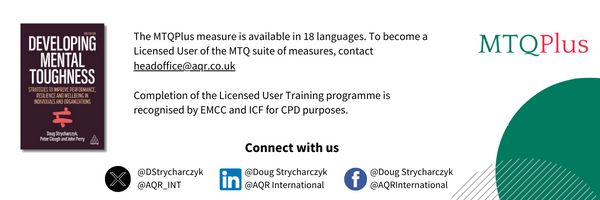Why Self-Awareness Matters
We have long understood the importance of self-awareness. A number of theories, tools and models have emerged to help the practitioner explore this idea.
One popular approach is to use the JOHARI window.

The limitation is that all these models are based on understanding behaviour, largely because we can observe behaviour.
It is why we see the development of competency frameworks, 360 appraisals, assessment centres, etc. But, as we know, behaviour is not the only aspect of personality that matters. Mental Toughness aka mindset, attitude, etc is perhaps fundamentally more important. However, it is invisible, so it is hard to assess reliably.
What we do observe is that often the more mentally tough, who can have advantages in many settings, will be successful at most things. They do not question it. They simply accept it. When a different setting appears, this can throw them, and they do not understand why. Despite this, mentally tough people are generally self-aware and can deal with change perfectly well.
Similarly, the more mentally sensitive can struggle to succeed and will begin to accept that they do not “have what it takes”. They, too, simply accept it.
Self-awareness here, for both, means “Do I understand what it is about my mental approach to events that either helps me to succeed or gets in the way of my success?”. If they do not understand this, they can “walk into problems”. This, of course, is what coaching seeks to address.
The triggers for seeking self-awareness can be many things but, in our work, we see there are four main triggers:
- Aspirations – I am not achieving my life and work goals.
- Agility – I am not dealing well with change and the pace of change.
and there are two, at the top of most people’s agenda, which can be interrelated.
- Wellbeing – struggling to deal with anxiety, stress, depression, etc.
- Performance – I am not achieving what I and others expect from someone of my ability.
These often manifest themselves in transition situations. People who have previously performed well in one role but do not in a new and different role. This has implications for promotion and talent management as well as for job change.
Someone who is effective at an operational level may not transit well to a more strategic level if they lack self-awareness about what they can or cannot bring to a role and respond appropriately.
Within the mental toughness concept, there may be an indicator of the extent to which an individual may develop the level of self-awareness needed for success. All the factors could play a role, but the Learning Orientation factor describes the extent to which an individual reflects on all that happens to them and around them and seeks to learn from that.
This results in a focus on solutions which could be a driver for self-awareness.
Assessing mental toughness is crucial for many, and perhaps for most people, who have to prosper in the increasingly challenging world of the 21st Century.



